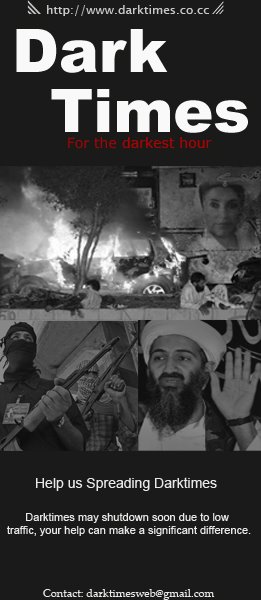Monday, July 7, 2008

Four bombs exploded in Pakistan's port city of Karachi on Monday injuring at least 40 people and killing one.
The explosions occurred in Banaras Chowk, Oraangi town, Shahrah-e-Noor area and Paharganj areas, rescue workers said.
At least 16 people were injured in two blasts in Banaras in Karachi while five others were injured in Shahra-e-Noor Jahan, near Sohail mosque.
Five more people were injured in a blast near a school in Hyderi.

Funerals have been held in Pakistan for the victims of a suicide bomb attack in the capital, Islamabad.
Yusuf Reza Gilani, Pakistan's prime minister, on Monday denounced the bombing that killed at least 20 people - mostly police - near a police station.
Sunday's attack was carried out just several hundred metres from the site of a rally marking one year since a deadly government raid on the Lal Masjid (Red Mosque).
After visiting some of the 50 people wounded by the blast, Gilani said: "This is against humanity. The law will take the culprits in its grip."
Police continued to investigate at the scene, discovering a severed head in bushes beside the road where the attack took place, according to Reuters news agency.
The heads of suicide bombers are often severed by the explosives strapped to their torsos.
Rehman Malik, the interior ministry chief, said a teenage boy was the suspected attacker.
Speaking to Geo TV hours after the explosion, he said: "All witnesses say that a 15- or 16-year-old boy, who had a light beard and wore a white shalwar kameez ... he came walking toward our police and blasted himself."
Al Jazeera's Kamal Hyder, reporting from Islamabad, said that the explosion happened on the edge of the security cordon.
People were leaving the mosque after the mostly peaceful rally when the attack targeting the police occurred, he said.
Rally marred
Thousands of police had been deployed across the capital for Sunday's memorial and a tight ring of security was in place around the gathering in front of the mosque.
Barbed wire and fences had been put up to prevent vehicles from entering the area while pedestrians had to pass through metal detectors.
Hyder said the bombing was likely to jeopardise the government's attempts to engage the leaders of armed groups carrying out attacks in the country.
There was some evidence to suggest that there were splinter groups that were not in favour of rapprochement with the government, he said.
Imtiaz Gul, a political analyst in Islamabad, told Al Jazeera that the attack came after threats from the Pakistani Taliban in northwest regions bordering Afghanistan.
"Baitullah Mehsud had indicated and threatened that if his people, with whom the government was talking ... if their prisoners are not released ... they would take revenge," he said.
"They clearly indicated it would be in Islamabad, Lahore or another big Pakistani city."
There were no immediate claims of responsibility for the blast.
Pakistani troops surrounded the mosque last July, clashing with pro-Taliban and alleged al-Qaeda members who were holed up inside before storming the building.
More than 100 people were killed in the military operation.
'Rooting out terrorism'
Pervez Musharraf, the president who ordered last year's assault, reiterated the government's "commitment to root-out terrorism in all its forms and manifestations", the state-run Associated Press of Pakistan news agency said.
He urged Gilani's government to do more to combat anti-government groups, warning that otherwise there would be "Red Mosques everywhere".
The level of violence in Pakistan has fallen since last year, but attacks are still relatively frequent.
In June, a suicide car bomber killed at least six people near the Danish embassy in Islamabad.
A statement attributed to al-Qaeda claimed responsibility for that blast, which was believed to have targeted Denmark over the publication of cartoons depicting the Prophet Muhammad.
Labels: Pakistan News







